As President Trump prepares to meet North Korean leader Kim Jong Un for their second one-on-one summit, in Hanoi, Vietnam, on Wednesday and Thursday, Secretary of State Mike Pompeo told Fox News the administration will abandon what he called the Obama administration's policy of "praying" and "cowering" before the rogue regime.
At the same time, both Pompeo and Trump sought to tamp down expectations that the meeting would produce a breakthrough, or lead to major concessions by either party.
Trump has predicted a "continuation of the progress" made during his first meeting with Kim in Singapore last June. During the Singapore summit, Kim said he was committed to the "complete denuclearization of the Korean Peninsula," which previously has meant the North would denuclearize only when the United States withdraws all its troops from South Korea and stops military drills with the ally.
In December, though, North Korea's state media said it would never abandon its nuclear program unilaterally unless Washington first removes its nuclear threat.
Heading into this week's summit, Trump has said that North Korea has not tested any nuclear weapons in months and that as long as that testing has ceased, he's in no rush.
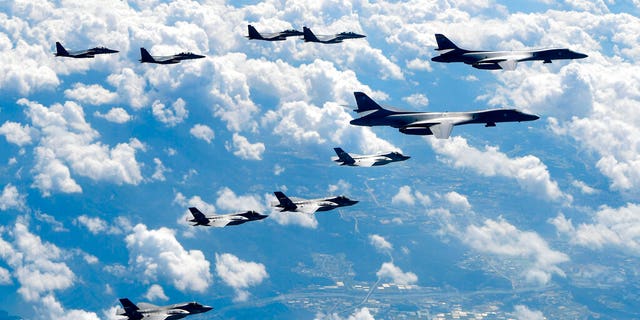
At a black-tie gathering of governors at the White House on Sunday evening, Trump said that he and Kim had "developed a very, very good relationship."
"We see eye-to-eye, I believe, but you’ll be seeing it more and more over the next couple of days," the president said. "I don’t want to rush anybody, I just don’t want testing. As long as there’s no testing, we’re happy."
Trump tweeted Sunday that he was leaving early the next day for the meeting in Hanoi, adding a tantalizing nod to "Denuclearization?" He also said Kim knew that "without nuclear weapons, his country could fast become one of the great economic powers anywhere in the World."
And, speaking to "Fox News Sunday," Pompeo said he was hoping for a "substantive step forward." He cautioned, "it may not happen, but I hope that it will."
The broader U.S.-South Korean alliance, sealed during the bloodshed of the 1950-53 Korean War, apparently won't be on the negotiating table during the summit in Hanoi on Feb. 27-28. But, some observers said its long-term future could be in doubt and Trump eventually may withdraw some of the 28,500 U.S. troops deployed in South Korea.
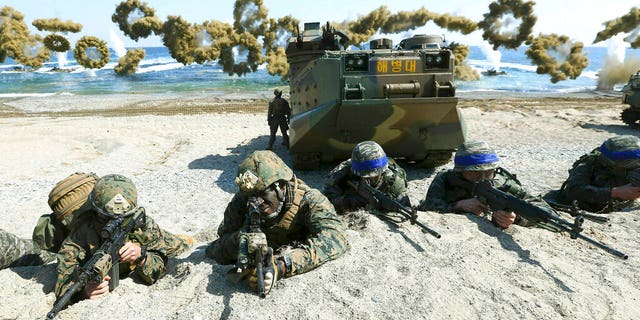
Trump repeated Friday that drawing down American forces was not on the table for his talks with Kim, but he previously had threatened to pull them from South Korea and Japan if those nations refused to pay more for their joint military activities. After the Singapore summit, Trump also told reporters, "I want to bring our soldiers [in South Korea] back home." While announcing the suspension of a major summertime military drill, Trump called the exercises "very provocative" and "tremendously expensive."
Pompeo said he hoped to put a "road map" in place but would not discuss the possibility of declaring a formal end to the Korean War or pulling some American troops from South Korea, in keeping with his stand against publicly discussing issues that could arise during the negotiations.
U.S. defense officials did not appear to be planning any troop reductions but some have indicated they would not be surprised if Trump puts reductions on the table as part of his negotiations with Kim.
"President Trump has also said this is going to take time. There may have to be another summit. We may not get everything done this week," Pompeo told "Fox News Sunday" anchor Chris Wallace.
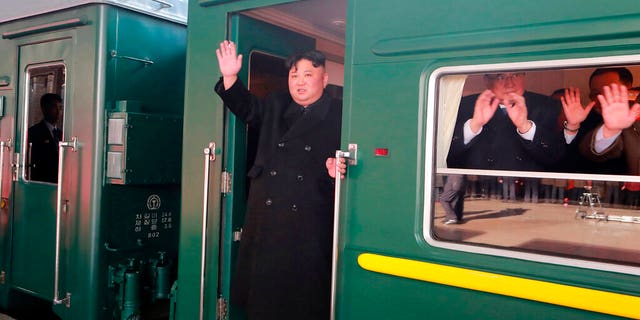
Kim was on a train Sunday to Vietnam, according to state media, and it could take over two days for the train to travel through China to Vietnam.
"There’s been no change in U.S. policy since the time I’ve been secretary of state and, frankly, even before that when I was CIA Director," Pompeo, who was also set to depart for Hanoi, told Wallace. "Our objectives are clear, our mission is clear. President Trump’s also said this is going to take time. There may have to be another summit. We may not get everything done this week. We hope we’ll make a substantial step along the way."
Pompeo added: "I've spent a lot of time with Chairman Kim. My time is on the ground today, continuing to flesh out paths forward, developing a roadmap for a path forward between the two countries. We're determined to achieve that. It's important for the world's security."
Pompeo said the summit "might be one day, might be two days" or even longer.
Asked whether North Korea has given concrete indications that it's willing to provide an inventory of its nuclear arsenal or surrender its weapons, Pompeo acknowledged some progress has stalled.
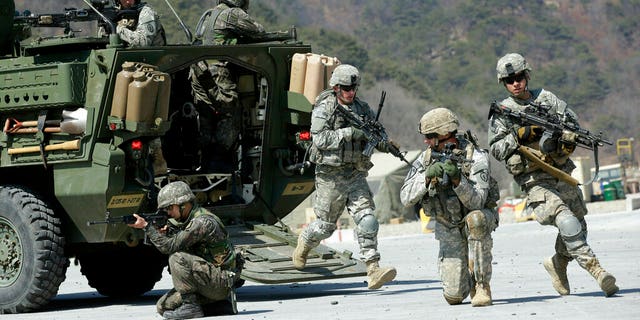
"In June of last year, in Singapore, Chairman Kim unequivocally stated he would denuclearize his country. There were other pillars that we committed to as well. We've made progress on some, less so on others. This is a complicated process. I was CIA director at one point. The history is difficult. The previous administration's policy was to allow the North Koreans to test [nuclear weapons], pray they'd stop, and then cower when they threatened us. Test, pray, and cower. That's been upended by President Trump."
Former President Obama asked the military in 2010 to prepare with South Korea in order to be “ready” to deter any aggression from North Korea – after North Korea sank its southern neighbor’s naval ship. And, throughout much of his presidency, Obama warned and criticized North Korea for testing nuclear bombs and implored the Chinese government to help alleviate the aggression.
"This is a complicated process."North Korean nuclear testing, which continued throughout the Obama administration, has dramatically slowed since Trump's inauguration. According to Pompeo, the White House effectively has forced Kim's hand.
— Secretary of State Mike Pompeo
"We've put real economic pressure on the North Koreans," Pompeo said. "We've built out ... the world's coalition to communicate to Chairman Kim that now is the time, now is the moment -- and I hope we'll make real progress on that this week."
Trump tweeted after the Singapore summit that there "no longer" was a nuclear threat with North Korea, and said repeatedly at rallies that "we fell in love" and "he wrote me beautiful letters." On Sunday, Pompeo suggested Trump's rhetoric was strategic.
"Relationships matter," Pompeo said. "They affect everything in our lives. Whether it's grand strategy and denuclearization, or simpler things. Relationships absolutely matter. It's important that the two leaders are able to effectively communicate."
On Twitter earlier Sunday, Trump wrote that he had a "great relationship with Chairman Kim," and added that "President Xi of China has been very helpful in his support of my meeting with Kim Jong Un. The last thing China wants are large scale nuclear weapons right next door. Sanctions placed on the border by China and Russia have been very helpful."
But, Sen. Ed Markey, a Massachusetts Democrat who serves on the Senate Foreign Relations Committee, expressed concerns about Trump's negotiating efforts Sunday, saying the president must be "careful" with what he offers.
"Nothing is clear, and I think as a result we could run the risk that Kim is given concessions which are not accompanied by real concessions that the United States is receiving in return from Kim and his regime," Markey told CBS News' "Face the Nation."
Separately on Sunday, Pompeo told CNN's "State of the Union" that the commitment Kim made "had substantially taken down the risk to the American people."
He also said "verifiable denuclearization" remained the administration's goal, and he insisted the administration has not changed the conditions for sanctions relief.
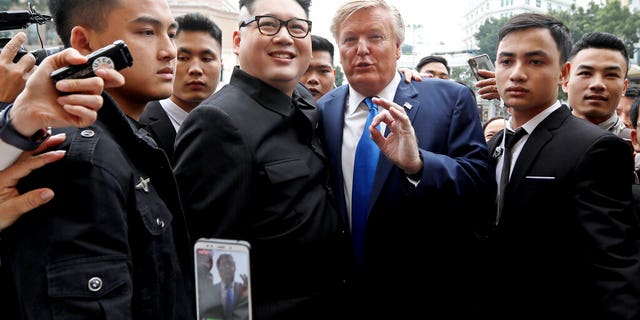
Meanwhile, in a bizarre episode that recalled similar antics from last year's Olympic Games, Vietnamese officials said they were not amused by the antics of two impersonators of Kim and Trump.
The duo has been making rounds of Hanoi, taking pictures with curious onlookers this weekend. However, on late Friday, a Kim lookalike, the Hong Kong-based impersonator who uses the name Howard X, posted on Facebook that about 15 police or immigration officers demanded a mandatory "interview" with them following a talk they gave at the state-run VTC station.
"They then said that this was a very sensitive time in the city due to the Trump/Kim summit and that our impersonation was causing a 'disturbance' and ... suggested that we do not do the impersonation in public for the duration of our stay as these presidents have many enemies and that it was for our own safety."




































